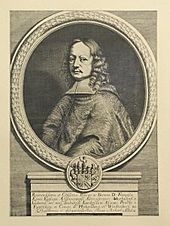Franz Egon von Fürstenberg-Heiligenberg
Franz Egon von Fürstenberg-Heiligenberg (born April 10, 1626 in Heiligenberg , † April 1, 1682 in Cologne ) was Bishop of Strasbourg , abbot of Murbach Monastery (from 1663 to 1682) and Prime Minister of Cologne .
Life
Franz Egon was the son of the Bavarian General Feldzeugmeister Landgrave Egon VIII von Fürstenberg-Heiligenberg (1588–1635) and his wife, Countess Anna Maria von Hohenzollern-Hechingen (1603–1652). His younger brother Wilhelm Egon von Fürstenberg succeeded him in the episcopate.
As a child, Franz Egon was friends with the Bavarian Prince Maximilian Heinrich , who was about the same age and later elector of Cologne , and joined him as a partner. Franz Egon was domiciled at Cologne Cathedral as early as 1634 . After he was ordained a subdeacon in 1644 , he became canon and canon of St. Gereon in Cologne in Cologne. Later he also acquired a cathedral canon of Hildesheim. Since 1650 mayor and first minister in Kurköln, he was also a secret councilor in the Principality of Liège in 1652 . From 1653 provost to St. Gereon in Cologne, canon of Minden, Strasbourg and Liège, shortly afterwards also canon at the Aachen Marienstift , he became cathedral dean in Cologne in 1655 .
In 1653, King Louis XIV of France pushed through the election of his ally as Bishop of Metz, but the papal appointment was not made, so that the election was ineffective. For this he was in 1660 canon of Speyer and abbot to Stavelot-Malmedy , a choice that was confirmed by the Pope only 1668th After he had been ordained a priest on October 16, 1660, Fürstenberg was elected Bishop of Strasbourg on January 19, 1663 and confirmed as bishop by the Pope on July 30, 1663. In the same year (1663) he chose the Cologne cathedral chapter to the provost and he received episcopal ordination . Elevated to the rank of prince in 1664, he was also made abbot of Murbach and Lüders in 1664.
The Fürstenberg brothers were very friendly to the French and for a long time determined politics in Bonn , the then royal seat of Cologne, and the electoral state. Especially after Elector Max Heinrich had appointed him in 1650 as Electorate Colonel Court Master and Prime Minister at the Bonn court. Franz Egon lived temporarily in Bonn with his brother. The purchase of the "Zur Blomen" house in 1666 is guaranteed by the elector who had acquired the house five years earlier from the sons of Elisabeth Kurtzrock. After Cologne was forced to make peace with Holland in 1674, Franz Egon von Fürstenberg went to Strasbourg and pursued a policy that was friendly to the French, with the help of which Louis XIV was able to seize the city. Now, in 1681, Franz Egon was able to take his bishopric there again. Shortly afterwards he returned to Cologne in the hope of being able to obtain the Electoral Chair, but he had fallen out of favor with the Elector. Franz Egon died in Cologne on April 1, 1682. His bones are buried in the cathedral.
Fürstenberg had a castle built in the Baroque style of the time in Mutzig in Alsace, which was ready for occupancy in 1673. Later it was taken over by Armand de Rohan and his descendants, which is why it is still called the Rohan Castle ( Château des Rohan ) today.
literature
- Max Braubach: Franz Egon Graf, Prince of Fürstenberg since 1664. In: New German Biography (NDB). Volume 5, Duncker & Humblot, Berlin 1961, ISBN 3-428-00186-9 , p. 368 f. ( Digitized version ).
- Leonhard Ennen : Franz Egon and Wilhelm Egon von Fürstenberg, bishops of Strasbourg . In: Allgemeine Deutsche Biographie (ADB). Volume 7, Duncker & Humblot, Leipzig 1877, pp. 297-306.
- Josef Niesen : Bonn Personal Lexicon. 3rd, improved and enlarged edition. Bouvier, Bonn 2011, ISBN 978-3-416-03352-7 .
Web links
| predecessor | Office | successor |
|---|---|---|
| Maximilian Heinrich of Bavaria |
Abbot of Malmedy and Stablo 1657–1682 |
Wilhelm Egon von Fürstenberg |
| Jules Mazarin |
Bishop of Metz 1658–1663 |
Wilhelm Egon von Fürstenberg |
| Moritz von Bentheim-Tecklenburg |
Hereditary bailiff of the Archbishopric of Cologne (pledge possession; until 1674 together with Hermann Egon zu Fürstenberg-Heiligenberg ) 1670–1688 |
Thomas and Gottfried von Quentel |
| personal data | |
|---|---|
| SURNAME | Fürstenberg-Heiligenberg, Franz Egon von |
| BRIEF DESCRIPTION | Bishop of Strasbourg |
| DATE OF BIRTH | April 10, 1626 |
| PLACE OF BIRTH | Heiligenberg |
| DATE OF DEATH | April 1, 1682 |
| Place of death | Cologne |




